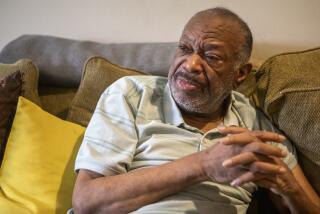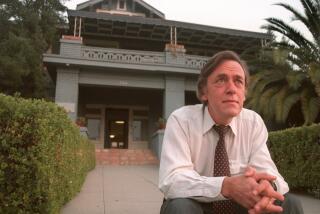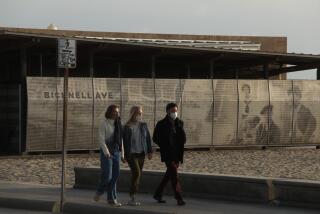David B. Finkel dies at 83; judge, Santa Monica City Council member
David B. Finkel, a retired judge, former Santa Monica City Council member, recent trustee of Santa Monica College and perennial activist, has died. He was 83.
Finkel died Saturday at his Santa Monica home of renal failure after a prolonged illness, his daughter Amy Shimshon-Santo said.
A civil liberties lawyer, Finkel was partial to progressive causes for decades. In the 1970s, he successfully fought for reinstatement of a Los Angeles Valley College English teacher who was fired for having her students read a poem that college officials later deemed pornographic. During the Vietnam War, Finkel represented conscientious objectors. Later, participating in a nuclear weapons protest at the Nevada Test Site, he was arrested.
As a municipal judge in Santa Monica, he decorated his courtroom with a 4-by-15-foot scroll by one of his wife Bruria’s art students. It contained the opening lines of the Declaration of Independence — in blocky, graffiti-style lettering.
“The act was pure Santa Monica to anyone familiar with the feisty, activist beach town that places public art on a par with community involvement,” the Los Angeles Daily Journal said in a 1991 profile. “It also said something about Finkel, who began his career in the 1960s, helping blacks in Mississippi register to vote.”
Later in his judicial career, Finkel walked a courthouse picket line in sympathy with striking clerks. That upset other judges and court officials, who eventually transferred him to a less-prominent position, Shimshon-Santo said.
“He had no regrets about it,” she said. “He always had a sense of what the right thing to do was, and he just did it.”
Finkel sat on Santa Monica’s powerful Rent Control Board and served a term on the City Council. He ran for municipal judge in 1990, and was elevated to the Superior Court bench in 2000. He retired in 2002.
The son of Russian Jewish immigrants, David Bruce Finkel was born in Newark, N.J., on Feb. 2, 1932. His father, Sidney, was a storefront lawyer. His mother, Reva Mucha, a pianist and non-practicing attorney, moved to Los Angeles in 1948, where she worked for a group called the American-Russian Institute. Ten years later, she was grilled by the House Un-American Activities Committee as members tried to ferret out Communist influence in Southern California.
At 15, Finkel was admitted to the University of Chicago. Graduating in 1951, he served in the U.S. Army before receiving his law degree from USC in 1959.
In 1969, he represented Deena Metzger, a writer who taught English at Valley College and was fired for using her original poem, “Jehovah’s Child,” in a class that delved into censorship and pornography. To preserve decorum during courtroom discussions, a judge in the case substituted numbers for some of the poem’s words.
The case made national headlines.
“Maintaining its proud record, Los Angeles has a new Zola case,” wrote Morrie Ryskind, a Pulitzer Prize-winning playwright, “and, as usual, a group of native Zolas has sprung to the defense of the embattled victim.”
Chief among them was Finkel, who won back Metzger’s job despite the Los Angeles Community College board’s charge that she had engaged in “immoral conduct.”
Finkel also represented the FM radio station KPFK, which in 1974 received a taped diatribe about police and government from the radical Symbionese Liberation Army and “Tania,” the name adopted by Patty Hearst after she was kidnapped by the group.
Finkel advised the station to resist the FBI’s request to examine the original recording, and the station manager, Will Lewis, went to jail for two weeks. Finkel’s reasoning was that the station, as a news agency, should not provide potential evidence to the government and become an unwitting arm of law enforcement.
In his later years, Finkel taught government courses at Santa Monica College. He was elected to the college’s board in 2006 and served until 2014, when he announced he would step down because of illness.
His survivors include his wife of 51 years, artist Bruria Finkel; brother George Finkel; daughters Melva Colter, Wendie Colter and Amy Shimshon-Santo; son Adam Finkel; and four grandchildren.
Twitter: @schawkins
More to Read
Start your day right
Sign up for Essential California for the L.A. Times biggest news, features and recommendations in your inbox six days a week.
You may occasionally receive promotional content from the Los Angeles Times.







